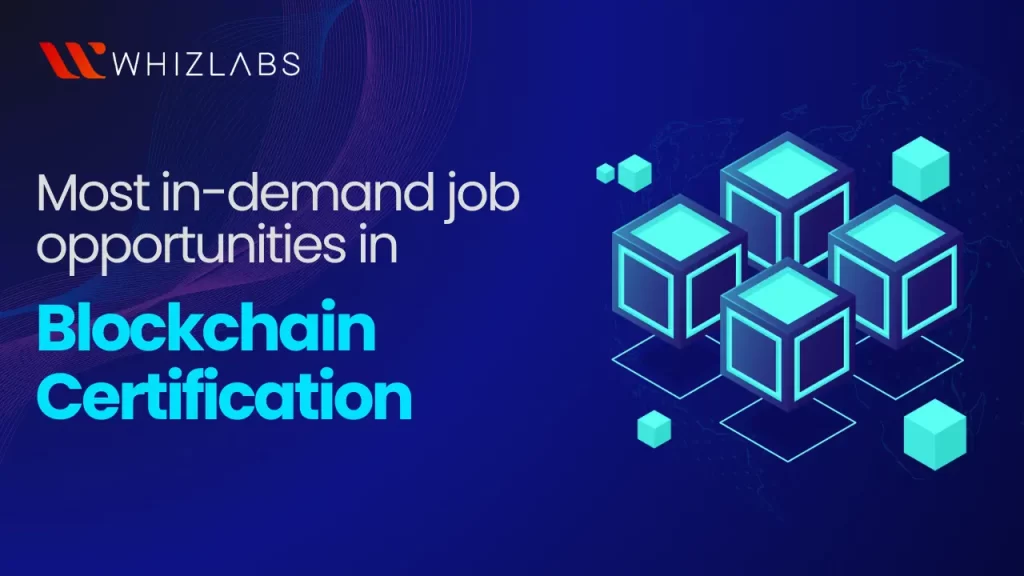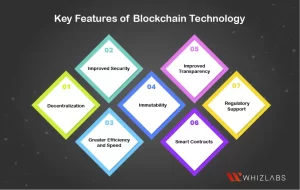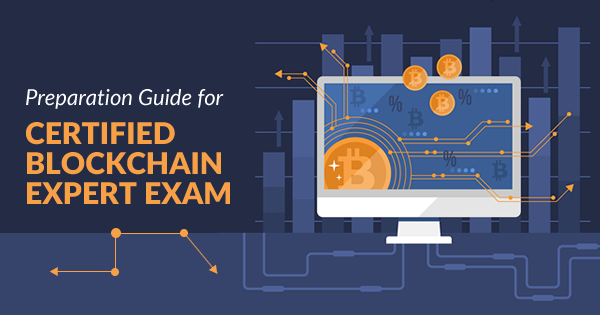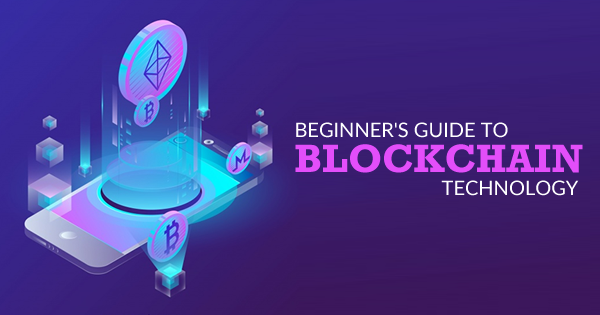Blockchain technology has significantly altered the operations of various industries in recent years. Recognized as a major disruptor in finance, healthcare, supply chain management, and numerous other sectors, this revolutionary technology has gained widespread popularity.
As a consequence of its increased adoption, there is a growing demand for qualified blockchain professionals. These proficient experts possess the ability to develop, implement, and manage blockchain solutions across diverse industries.
This blog post will outline the top highest-paying blockchain jobs that are anticipated to be in high demand in the future.
Let’s dive in!
What is blockchain technology?
In simple terms, a blockchain is a digital and decentralized public ledger that electronically stores information. It functions as a distributed database, organizing transactions into secure and linked blocks.
The unique aspect of a blockchain network lies in its reliance on decentralization, eliminating the need for a central authority to govern or validate transactions. Instead, a network of computers, known as nodes, verifies the entered data.
Also referred to as Distributed Ledger Technology (DLT), blockchain employs cryptographic encryption to record and secure data. Each data block is linked to the preceding and succeeding blocks, creating a chain that depicts the flow of transactions and ownership changes.
This linkage prevents intrusion, deletion, or alteration within the blockchain, establishing immutability or tamper-proof security and transparency. To deepen your understanding and expertise in this transformative technology, you can take comprehensive blockchain certification courses.
Read More: A Beginner’s Guide on Blockchain Technology
Key Features of Blockchain Technology
The unique features of blockchain technology are as follows:
1. Decentralization
Blockchain operates without a central governing authority, relying on participating nodes to validate transactions through consensus mechanisms like Proof-of-Work or Proof-of-Stake. This decentralized structure reduces operational costs and enhances speed.
2. Improved Security
Data accuracy is validated by all network nodes, enhancing security. The decentralized and cryptographic nature of blockchain makes it challenging for hackers to compromise data. The immutability feature ensures permanent and secure transaction records.
3. Greater Efficiency and Speed
Blockchain’s decentralized structure enables quick verification of transactions by participating nodes, eliminating the need for third-party intermediaries. This enhances efficiency, speeds up transaction processing, and reduces costs.
4. Immutability
Transactions are time-stamped and recorded permanently, ensuring that data remains unchanged and secure. This feature prevents deletions, alterations, or modifications in the stored data, making blockchain highly secure for various applications.
5. Improved Transparency
All participating nodes have equal access to the data, promoting transparency within the system. Cryptographic encryption secures transactions, and all nodes can securely access and verify the data entered into the blockchain.
6. Smart Contracts
Smart contracts play a pivotal role by automating the execution of contracts between parties. These self-executing contracts have terms written directly into lines of code, enhancing efficiency and reliability in agreements between buyers and sellers.
7. Regulatory Support
Many governments worldwide are recognizing the potential of blockchain technology and have introduced favorable regulatory frameworks. This regulatory support is crucial as it encourages businesses to adopt blockchain, fostering a more conducive environment for its growth and integration.
These factors collectively contribute to the accelerated expansion of the blockchain industry, offering enhanced security, transparency, efficiency, and cost-effectiveness across diverse sectors.
Top 10 Highest-Paying Blockchain Jobs
If you’re curious about job opportunities and careers in the blockchain space, let’s explore some of these positions together.
Here are a few blockchain jobs that are getting high pay:
1. Blockchain Developer
Blockchain developers play a pivotal role in ensuring secure digital transactions. They build systems to securely record and store blockchain data, safeguarding it against hacks or unauthorized modifications.
Blockchain Developers are responsible for designing, implementing, and maintaining blockchain solutions. This includes creating blockchain-based applications, developing smart contracts, and ensuring security and scalability.
Before diving into the field of blockchain, it’s essential to sharpen the following skills: Microsoft SQL Server, MySQL, .NET, AJAX, Visual Studio, Javascript, JQuery, Node.js, REST, Neural networks, Regression, Agile Scrum, and programming languages like C++, C#, HTML, XML, etc.
These professionals are involved in developing secure blockchain technologies, implementing application features, and creating user interfaces. Additionally, they manage both client- and server-side applications.
Average Salary: Approximately $150,000 per year, depending on experience, skills, and location.
2. Blockchain Architect
Responsible for designing and implementing blockchain systems, focusing on architecture, infrastructure, and security aspects. This involves creating networks, protocols, and consensus algorithms, and ensuring regulatory compliance.
Average Salary: Approximately $175,000 per year, reflecting expertise in building and maintaining critical blockchain networks.
3. Blockchain Administrator
Oversees the operations of a blockchain network, ensuring optimal functioning, security, and support for participants. Responsibilities include managing nodes, resolving network issues, deploying smart contracts, and collaborating with stakeholders.
Average Salary: Around $84,000 annually, with potential variations based on the company and industry.
4. Blockchain Project Manager
Database systems and blockchain processing are critical components of any enterprise’s systems. These systems must provide high reliability and performance. The role of a Blockchain Project Manager is considered one of the most challenging blockchain jobs in India.
Their responsibility includes overseeing blockchain processing activities and ensuring that the systems operate at peak efficiency. This involves managing the intricacies of database systems and blockchain technology to achieve optimal reliability and performance within the enterprise.
They will manage the entire life cycle of blockchain projects, from initiation to closing. This involves identifying project requirements, overseeing teams, monitoring progress, and ensuring timely delivery.
Average Salary: Ranges from $120,000 to $170,000 per year, influenced by seniority, location, and company size.
5. Blockchain UX Designer
Designs intuitive interfaces for blockchain-based applications, focusing on user experience. Responsibilities include user research, wireframing, prototyping, and collaboration with developers and product managers.
The increasing and substantial demand positions product managers among the highest-paying blockchain jobs in India.
Average Salary: Between $100,000 and $150,000 annually, with potential variations based on organizational size and complexity.
6. Blockchain Quality Engineer
Blockchain quality engineers play a crucial role in ensuring the high quality of all blockchain spaces and their enhancements. Their primary responsibilities include managing manual testing, automation systems, and dashboards.
They thoroughly examine the developed applications to identify any glitches or issues. If bugs are found, blockchain quality engineers are responsible for addressing them within the organization. Their ultimate goal is to ensure the final product is free of any defects.
Specialized in testing and ensuring the quality of blockchain infrastructure. Manages testing pipelines, ensures security and stability, and identifies potential bugs and issues.
To secure a well-paying blockchain jobs in India, it’s essential to have a comprehensive understanding of the framework of blockchain platforms.
Additionally, strong critical thinking and reasoning skills are significant for excelling in a career as a blockchain quality engineer.
Average Salary: Currently ranges from $130,000 to $190,000 annually, showcasing the increasing demand for expertise in this field.
7. Blockchain Consultant
Advises businesses on applying and integrating blockchain into operations. Assists in developing blockchain-based solutions, identifying tech-stack uses, and ensuring regulatory compliance.
Average Salary: Around $175,000 a year, reflecting the high demand for expertise in the industry.
8. Blockchain Legal Consultant
Provides legal advice on the legal implications of blockchain technology. Assists in understanding regulatory requirements, reviews contracts, and addresses compliance with data protection regulations.
The increasing and substantial demand positions legal consultants among the highest-paying blockchain jobs in India. From this standpoint, attorneys can bridge the crypto ecosystem with the existing financial structure by offering the following services:
- Drafting legal agreements
- Conducting negotiations
- Performing due diligence
- Supporting activities such as mergers and acquisitions, etc.
Average Salary: Approximately $150,000 per year, expected to increase as businesses recognize the importance of blockchain technology.
9. Blockchain Engineer
Designs, implements, and maintains blockchain systems. Responsibilities include creating blockchain architecture, resolving technical issues, and staying updated on the latest blockchain technology. Nowadays, Blockchain Engineer falls under the category of highest paying blockchain jobs.
Average Salary: Around $175,000 per year, with variations based on experience, location, and company size.
10. Blockchain Analyst
Studies blockchain data to identify trends and insights for business improvement. Analyzes transaction data, tracks market trends, and possesses strong analytical and technical skills.
Average Salary: Ranges from $70,000 to $165,000 per year, reflecting the complexity and analytical skills required.
Blockchain jobs Salary
According to leading job search sites, blockchain-related positions in India offer an average annual salary of Rs 8 lakh. Blockchain developers can earn anywhere from Rs 5 LPA to Rs 30 LPA, and professionals with three years of experience can reach up to Rs 45 LPA.
In the BFSI sector, senior positions related to security operations can command salaries of up to Rs 4 crore annually. Top companies like IBM, Visa, Microsoft, and Deloitte Consulting LLP are prominent recruiters for mid to senior-level blockchain roles.
Job location significantly influences remuneration. Here’s a breakdown of average annual salaries based on geography:
- Asia: $87,500
- Europe: $73,300
- UK: $90,000 (Startups pay between $50k and $60k a year)
- US: $136,000
Beyond traditional full-time positions, the remote and freelance markets for blockchain professionals are thriving. Employers regularly post new opportunities on online freelancing platforms.
According to an Upwork report, blockchain is poised to become the cloud of the 21st century. The average pay rate for individuals in this field ranges from $65 to $250 per hour, depending on experience and the nature of the assignment.
How to step into the blockchain field?
Blockchain technology is rapidly gaining popularity, transforming various industries and offering an excellent career path for those interested in the technology sector with high growth potential.
Here are steps to guide you on how to start a career in blockchain technology and secure some of the highest-paying blockchain jobs:
Establish a Fundamental Understanding of Blockchain
You can enrich the foundation knowledge by answering fundamental questions about blockchain, such as the composition of blocks and chains in a decentralized system and the mechanisms for achieving consensus. You can take blockchain certifications to gain the fundamentals of blockchain.
Acquire Knowledge of Cryptocurrencies
Explore existing use cases of blockchain applications and gain familiarity with the functioning of cryptocurrencies to get started with the blockchain.
Develop Business Acumen
Consider how blockchain can be leveraged to achieve business objectives. Understand how different teams and departments can collaborate and adapt to this emerging technology. Enhance your social and people management skills if required for your role.
Learn New Programming Languages
While Java and HTML are essential programming languages nowadays and thus broadening your skills by learning modern programming languages is highly recommended. This is crucial for becoming a proficient professional in the blockchain domain.
Become an Engineering Expert
You can able to engage in systematic learning to acquire advanced knowledge in blockchain and application development. Study how various organizations adapt to diverse business scenarios through technological solutions.
Understand Blockchain Applications
Research how blockchain is reshaping existing business operations and how innovations are synergizing with other technologies to achieve scalability and profitability.
Enhance Your Profile with Hands-on Experience
Gain practical experience by taking up a blockchain internship or an entry-level position in a startup. This hands-on approach helps you identify your areas of interest while learning on the job.
Enroll in a Specialized Program
If you have completed your undergraduate degree and have a few years of experience in a technical field, consider opting for a postgraduate course in blockchain technology management.
For those wanting to continue working while studying, explore online executive options available on platforms like Whizlabs.
FAQs
Which certification is best for blockchain?
For those aiming to establish expertise in blockchain technology, the “Certified Blockchain Professional” offered by EC-Council stands out as a premier certification. It provides comprehensive coverage, equipping individuals with the necessary knowledge and skills to excel in the blockchain domain.
Is a blockchain certification worth it?
Obtaining a blockchain certification serves as a commendable method for tech experts to affirm and exhibit their proficiency in blockchain. It significantly bolsters the credibility of their resumes in the eyes of potential employers and peers alike.
Is blockchain high-paying?
Yes! Within the programming landscape, blockchain ranks among the top in terms of remuneration. Developers specializing in blockchain frequently surpass the earnings of their peers proficient in alternative programming languages. Even a foundational grasp of blockchain concepts holds significant value. Typically, those venturing into blockchain development can anticipate earning salaries in the six-figure range.
Is coding essential for blockchain?
Absolutely. To craft your unique blockchain application or initiative, coding expertise is paramount. A robust grasp of programming languages such as Solidity (specifically for Ethereum) or C++ (especially for Bitcoin) is necessary. These languages facilitate the creation of smart contracts and the establishment of foundational structures for your blockchain ecosystem.
Conclusion
Hope we have covered the most promising blockchain jobs. The above list encompasses a diverse range of job options, catering to the preferences and interests of professionals from various domains.
Individuals seeking opportunities can select their preferred job from the list based on their instincts and expertise.
If you’re keen on improving your practical skills in crypto, take our real-time hands-on labs. We also offer a range of courses and certifications on blockchain technology, providing in-depth knowledge on the subject.
- Top 25 AWS Data Engineer Interview Questions and Answers - May 11, 2024
- What is Azure Synapse Analytics? - April 26, 2024
- AZ-900: Azure Fundamentals Certification Exam Updates - April 26, 2024
- Exam Tips for AWS Data Engineer Associate Certification - April 19, 2024
- Maximizing Cloud Security with AWS Identity and Access Management - April 18, 2024
- A Deep Dive into Google Cloud Database Options - April 16, 2024
- GCP Cloud Engineer vs GCP Cloud Architect: What’s the Difference? - March 22, 2024
- 7 Ways to Double Your Cloud Solutions Architect Role Salary in 12 Months - March 7, 2024



